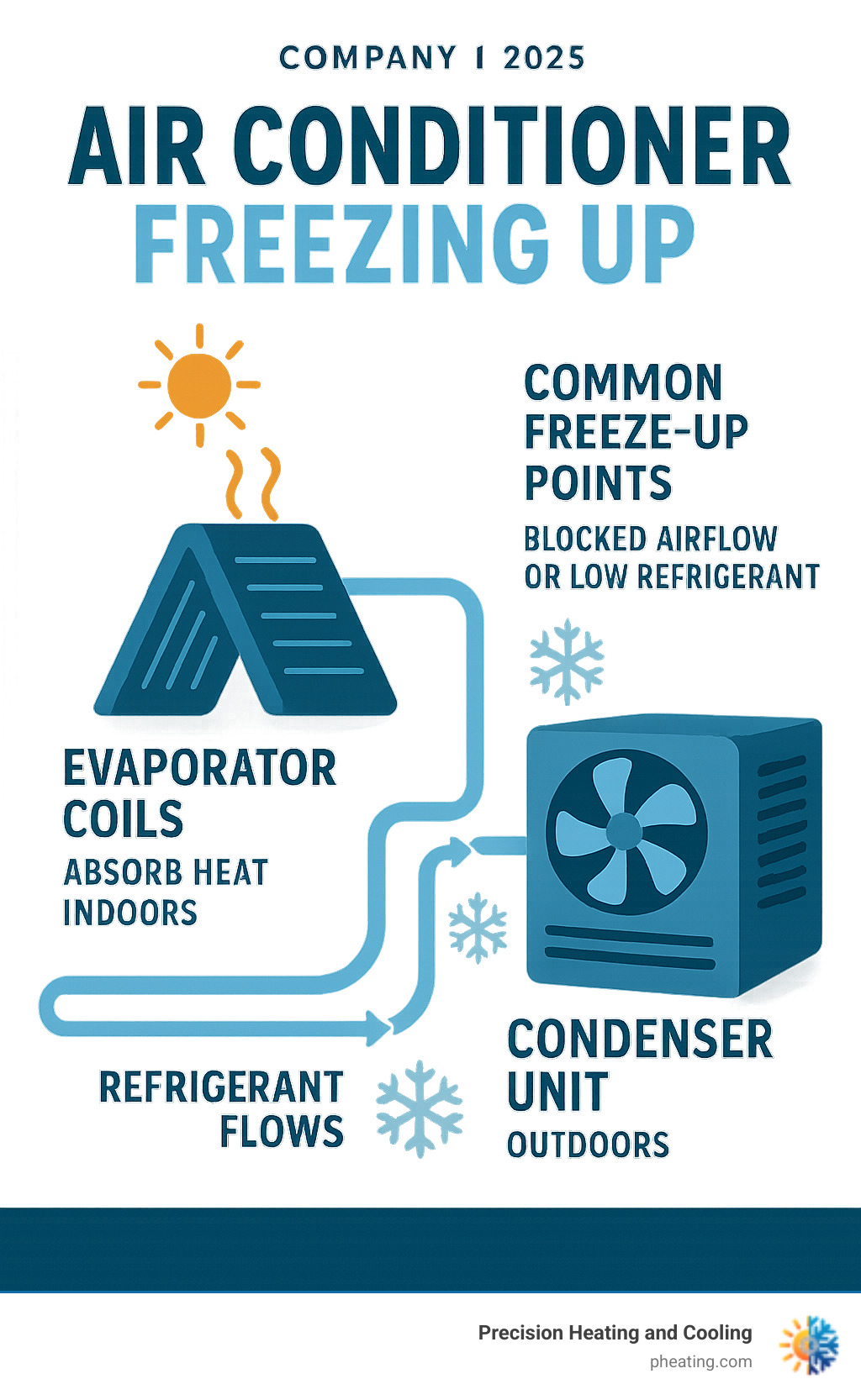When Summer Heat Meets Winter Ice: Understanding AC Freeze-Ups
Air conditioner freezing up is one of the most confusing problems homeowners face during hot summer days. Picture this: it's 95°F outside, your house feels like an oven, and your AC unit looks like it belongs in Antarctica with thick ice coating the pipes and coils.
Quick Answer for Frozen AC Units:
- Turn off your AC immediately - continuing to run it can damage the compressor
- Switch thermostat fan to "ON" to help melt the ice
- Check your air filter - dirty filters are the #1 cause of freezing
- Wait 4-24 hours for complete thawing before restarting
- Call a professional if the problem repeats after basic troubleshooting
This frustrating situation happens more often than you'd think. Dirty air filters cause most AC freeze-ups by blocking airflow over the evaporator coils. When warm air can't flow properly, the coils get too cold and any moisture in the air turns to ice.
Other common culprits include low refrigerant levels from leaks, blocked vents, and running your AC when outdoor temperatures drop below 62°F.
The good news? Many frozen AC problems can be prevented with simple maintenance. But when ice forms, acting quickly protects your system from expensive damage like a blown compressor.
In this guide, we'll show you exactly how to spot the warning signs, understand what's causing the freeze-up, and take the right steps to get your cooling back on track.

First, The Warning Signs: How to Tell if Your AC is Frozen
Your air conditioner freezing up doesn't happen overnight—it usually gives you plenty of warning signs first. Think of these clues as your AC's way of crying for help before it turns into an expensive ice sculpture.
The most obvious red flag is visible ice or frost coating your system. You might spot ice forming on the copper refrigerant lines running between your indoor and outdoor units, or thick frost covering your outdoor unit's coils and fan area. If you can peek at your indoor evaporator coil, it might look like someone stuffed a snowball maker inside your air handler.
But ice isn't always visible, especially on indoor components. That's when you need to pay attention to performance changes. Reduced or no cool air from your vents is a dead giveaway that something's wrong. When your evaporator coil is frozen solid, it can't absorb heat from your home's air—leaving you sweating while your AC runs constantly without cooling anything. If you're dealing with this frustrating problem, our guide on How to Fix Warm Air from AC Vents can help.
Here's where things get messy (literally): puddles or water leaks around your indoor unit. All that ice has to go somewhere when it melts, and if your condensate drain pan can't handle the overflow, you'll find unwelcome water puddles around your furnace or air handler. In worst-case scenarios, water might even drip from your ceiling if the unit is in your attic.
Don't ignore strange sounds either. Hissing or bubbling noises often signal refrigerant leaks, which frequently lead to freezing issues. Your AC shouldn't sound like a science experiment gone wrong.
Catching these warning signs early can save you from major headaches and expensive repairs. If you're noticing multiple symptoms or aren't sure what's normal for your system, check out our comprehensive guide on Signs You Need AC Repair for more detailed troubleshooting help.
Why Is My Air conditioner freezing up? The Main Culprits
Understanding why your air conditioner freezing up is happening is the first step to a lasting solution. An AC unit freezes when its evaporator coil gets too cold, causing moisture from the air to freeze on its surface instead of draining away. This process relies on refrigerant expanding into a gas to absorb heat, a principle known as the Joule-Thomson Effect. If this balance is disrupted, the coil gets too cold and ice forms.
Ignoring a frozen AC can lead to severe compressor damage, as the compressor is not designed to handle liquid refrigerant. This strain can cause a complete system failure.
Let's explore the main culprits.
Insufficient Airflow: The Most Common Reason for an Air conditioner freezing up

By far the most frequent cause, insufficient airflow means the evaporator coil can't absorb enough warm air. This causes the refrigerant inside to get too cold, leading to a freeze-up. Here’s how it happens:
Dirty air filters: A clogged filter is a top cause of freezing. It blocks the warm air your evaporator coil needs to prevent icing over. We recommend checking your filter monthly and replacing it every 1-3 months. The U.S. Department of Energy states this can improve efficiency by 5% to 15%. For help, see Here is some more information.
Blocked vents and registers: Furniture, drapes, or toys can block vents, restricting airflow and causing the AC to freeze. Closing too many supply registers can also create pressure imbalances that lead to the same problem.
Obstructed return vents: Return vents pull warm air into the system. If they are blocked by furniture or rugs, your AC can't "breathe" properly, leading to airflow issues.
Dirty evaporator coils: Over time, dust can build up on the evaporator coils. This dirt insulates the coil, preventing it from absorbing heat efficiently and causing it to freeze.
Malfunctioning blower fan: The blower fan moves air across the evaporator coil. If the motor is damaged, it can't move enough air, which leads to freezing. If you suspect blower fan issues, our article on Common AC Fan Motor Problems in Homes can offer insights.
Low Refrigerant: A Critical Cause of an Air conditioner freezing up
Refrigerant is the lifeblood of your AC. Since it operates in a closed loop, low refrigerant almost always means there's a leak. When levels drop, the pressure inside the evaporator coil also drops. This causes the remaining refrigerant to expand too much and get excessively cold, freezing the coil.
Signs of a refrigerant leak include:
- Hissing or bubbling sounds
- A decline in cooling performance
- Higher energy bills
- Ice on the coils or lines
An oily residue around refrigerant lines can also indicate a leak. Our article on Signs of AC Refrigerant Line Damage provides more details.
Important: Refrigerant leaks require professional repair. Simply adding more refrigerant is a temporary, costly, and environmentally irresponsible fix. A certified technician must find and repair the leak before recharging the system.
Other Potential Causes
While airflow and refrigerant issues are primary culprits, other problems can cause an air conditioner freezing up:
Clogged condensate drain line: If the line that removes moisture gets clogged, water can back up and freeze around the coil. Our article on AC Drain Line Blockages in San Jose has more info.
Faulty thermostat: A malfunctioning thermostat can cause the AC to run continuously, leading to a freeze-up. For thermostat issues, consider our Thermostat Replacement San Jose CA service.
Mechanical failures: A faulty component like a Thermostatic Expansion Valve (TXV) can restrict refrigerant flow and cause freezing.
Electrical issues: Faulty wiring can cause components like the blower fan to run improperly, indirectly causing freezing.
Running AC below 62°F: AC units aren't designed to run in cool weather. When outdoor temperatures are below 62°F, the refrigerant pressure can drop too low and cause the system to freeze. It's often better to open windows on cool nights.
What to Do When Your AC is a Block of Ice: Immediate Steps
Finding your air conditioner freezing up on a sweltering summer day can feel like finding a snowman in your backyard—completely out of place and more than a little concerning. Take a deep breath. While it looks dramatic, taking the right steps immediately can save your system from serious damage.
Turn your AC off at the thermostat right away. This isn't the time to just nudge the temperature down a degree or two. Switch that system mode from "Cool" straight to "Off." Your compressor is working overtime trying to cool a frozen coil, and continuing to run it is like asking someone to sprint while wearing concrete boots—it's going to cause damage.
Once you've stopped the cooling cycle, set the fan to "ON" instead of "Auto." This clever move keeps your indoor blower fan running, circulating warmer air over that frozen evaporator coil. Think of it as giving your AC a gentle warm hug to help it thaw out. This simple step can cut your thawing time significantly.
Now comes the hardest part: waiting for the thawing process. Patience isn't just a virtue here—it's essential. Depending on how thick that ice buildup is, you're looking at anywhere from several hours to a full 24 hours. You'll know the ice has completely melted when you can't see any frost on the outdoor unit's lines and water stops dripping from the condensate drain.
While your AC takes its ice-melting timeout, check your air filter. If it looks like it could use a good cleaning (or better yet, a replacement), now's the perfect time. A clogged filter is often the main culprit behind freezing issues.
Take a walk around your home and clear any blocked vents. That decorative plant covering the return vent or the couch pushed against a supply register might seem harmless, but they're actually choking your system's ability to breathe properly.
Keep an eye out for water damage as the ice melts. Your condensate drain pan might overflow, or you could see puddles forming around your indoor unit. Clean up any standing water promptly—nobody wants to deal with mold growth on top of AC problems.
Once everything has thawed completely and you've addressed the obvious airflow issues, you can cautiously switch your thermostat back to "Cool." Keep a close watch for the next few hours to make sure your system is cooling properly and that ice isn't forming again.
If your air conditioner freezing up becomes a repeat performance, or if you suspect something more complex like a refrigerant leak, it's time to call in the professionals. For additional troubleshooting guidance, check out our comprehensive guide on Troubleshooting Common AC Repair Scenarios.
Long-Term Prevention: Keeping Your AC Ice-Free
The best way to handle an air conditioner freezing up is to prevent it. Like car care, regular AC maintenance prevents breakdowns on the hottest days. Proactive care also extends your system's lifespan, improves energy efficiency, and lowers energy bills, giving you peace of mind.

Routine Homeowner Maintenance
A few simple, regular tasks can make a huge difference in preventing your AC from freezing up.
Regular filter changes are crucial. Since dirty filters are a primary cause of freezing, check yours monthly and replace it every 1-3 months (or more often if you have pets or allergies). Here is some more information on this simple task.
Your outdoor unit needs breathing room. Clear away leaves, grass clippings, and other debris. Trim back bushes and plants to maintain at least two feet of clearance on all sides for proper operation.
Inside, keep an eye on your vents and registers. Furniture and rugs can easily block them. Do a quick walk-through every few weeks to ensure air can flow freely.
Pay attention to how your system sounds and feels. If you notice strange noises, weaker airflow, or slower cooling, don't ignore these warning signs. Catching problems early prevents them from becoming expensive headaches.
The Role of Professional Tune-Ups
While homeowner maintenance is key, there's no substitute for professional expertise. An annual tune-up is a comprehensive check-up for your AC, catching problems you might miss and ensuring peak performance.
During a professional service visit, our technicians:
- Thoroughly clean both the evaporator and condenser coils with specialized tools to remove stubborn buildup and restore optimal heat transfer.
- Check refrigerant levels with certified equipment, verifying correct amounts and inspecting for leaks.
- Perform a complete inspection of the blower motor and fan, cleaning blades and checking bearings to ensure proper airflow.
- Inspect and tighten all electrical connections to prevent malfunctions that can cause freezing or other damage.
- Clear your condensate drain line to prevent backups and check thermostat calibration for accuracy.
The U.S. Department of Energy emphasizes that Maintaining your air conditioner through regular professional service extends equipment life. Our article on AC Tune-Ups: Why Technicians Recommend Them Yearly explains more about why this annual investment pays off.
At Precision Heating and Cooling, we recommend scheduling your tune-up in the spring, before the summer heat arrives. It's much better to find and fix potential problems when the weather is mild than to deal with an air conditioner freezing up during a July heat wave.
For more information about the importance of regular maintenance, check out our guide on The Importance of Regular AC Service.
Frequently Asked Questions about a Frozen AC
When your air conditioner freezing up is a recurring problem, you likely have questions. As experts serving Bay Area homeowners for over two decades, here are the answers to questions we hear most often.
Why does my AC freeze up at night?
It's puzzling why an AC freezes at night after a hot day. Several factors are usually at play:
- Cooler outdoor temperatures: When nighttime temperatures drop below 62°F, your AC system struggles to maintain the proper refrigerant pressure needed to operate without freezing.
- Lower heat load: Your home is naturally cooler at night. With less heat to absorb from the air, the evaporator coils can get too cold, especially if your AC unit is oversized.
- Thermostat settings: Setting the thermostat too low at night forces the system to work overtime in cooler conditions, which can lead to freezing.
- Insufficient airflow: A dirty filter or blocked vent that was a minor issue during the day can become a major problem at night when there's less heat for the system to absorb.
Can a frozen AC unit damage the compressor?
Yes, a frozen AC can absolutely damage the compressor. The compressor is the heart of your AC, and it can be destroyed by liquid refrigerant return.
Your compressor is designed for gas refrigerant. When the coil freezes, liquid refrigerant can flow back to it. Since liquids don't compress, this "liquid slugging" puts severe strain on internal components, which can lead to catastrophic failure and expensive repairs. This is why we stress that air conditioner freezing up requires immediate attention, as discussed in our article on why Timely AC Repair Crucial for Optimal Performance.
How long does it take for an AC unit to thaw?
Patience is key when thawing a frozen AC. The process typically takes several hours, usually from 4 to 12 hours. For thick ice buildup, it could take up to 24 hours.
The exact time depends on the ice thickness and the indoor temperature. Running the fan-only mode speeds up thawing by circulating warm indoor air over the coil.
Ensure all ice is gone before restarting your AC. Rushing it will likely cause it to freeze again. It's worth the wait to avoid a repeat problem.
Don't Get Left in the Heat—Get Expert Help
When your air conditioner freezing up turns your comfortable home into a sweltering sauna, you know it's time to take action. While recognizing the symptoms and following our DIY troubleshooting steps can help get you through the immediate crisis, many underlying causes require a professional's trained eye and specialized tools.
Refrigerant leaks are particularly tricky—they require specialized equipment to detect and EPA-certified technicians to repair safely. Complex mechanical failures like a faulty expansion valve or damaged compressor components aren't something you want to tackle with a YouTube video and good intentions. And sometimes, what seems like a simple airflow issue actually points to deeper problems with your ductwork or system design.
At Precision Heating and Cooling, we've seen it all over our two decades of experience serving homeowners throughout the San Jose Bay Area and Central Valley. We understand that a frozen AC unit doesn't just affect your comfort—it can disrupt your entire household, especially during those scorching California summers.
Our experienced technicians don't just slap a band-aid on the problem and call it a day. We dig deep to find the root cause of why your system keeps freezing up. Whether it's a sneaky refrigerant leak, a failing blower motor, or a combination of issues working against you, we're committed to system safety and lasting solutions that keep your home comfortable for years to come.
We know that AC repairs can feel overwhelming, which is why we offer competitive pricing and flexible payment options to fit your budget. Our reliable service extends throughout San Jose, Cupertino, Los Gatos, Clovis, Palo Alto, Santa Clara, Sunnyvale, and Hanford, California.
Don't let a frozen AC escalate into a complete system breakdown or expensive compressor replacement. If your unit keeps freezing despite your best troubleshooting efforts, or if you're hearing those concerning hissing sounds that might indicate a refrigerant leak, it's time to call in the experts.
Ready to get your cooling back on track? Contact us for expert AC repair in Fresno, CA and let us restore your home's comfort with the professional service you deserve.

Flexible payment options to make your goals affordable and stress-free.

Keeping it Close: Local Heater Installation Services in Santa Clara

Heater Installation Without Breaking the Bank in Santa Clara













.avif)










.avif)